The Mass Misunderstanding of "My Soul to Take"
Wes Craven's most critically condemned project is overdue for a redemption arc.
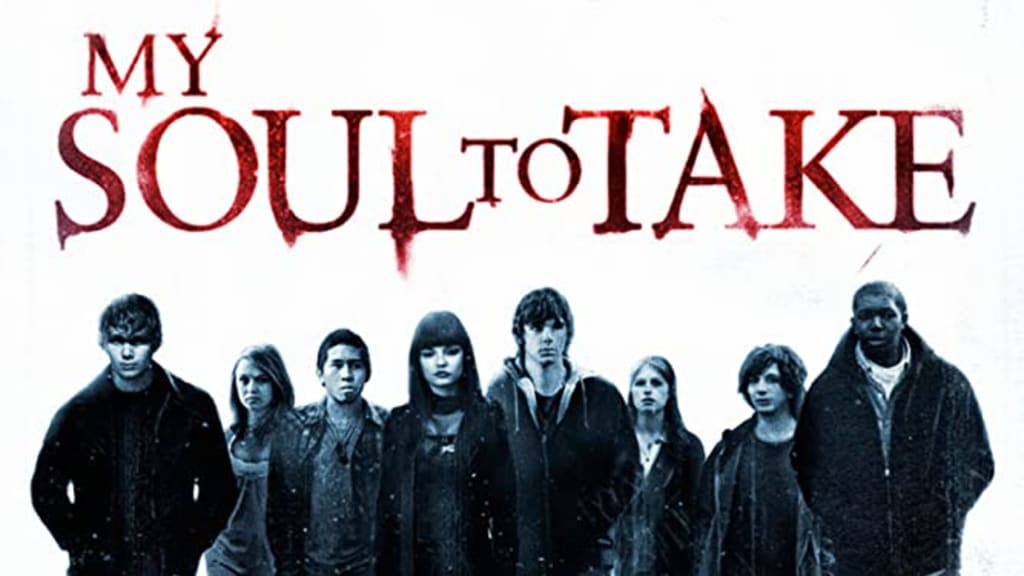
WARNING: This op-ed contains spoilers.
I've never had a hard time naming a favorite horror director. Through a decade and a half of expanding my palate and knowledge of horror cinema, it’s the only question that stands unchanged in my indecisive mind. I can’t tell you my favorite Final Girl, favorite special effects artist, or even my all-time favorite subgenre, but I've always been able to answer “so, who's your favorite director?” with a triumphant exclamation of the late, great Wes Craven. Unfortunately for almost everyone who’s asked me this icebreaker, the conversation always seems to sever when we arrive at the dreaded ranking of his films and a completely guiltless guilty pleasure of mine is always put dead last.
“My Soul to Take, hands down the worst thing he ever did,” my bar stool companion confidently retorts, followed by a hearty laugh at my hushed suggestion that it’s not that bad.
What could I know, though? I haven't even had the stomach to watch Last House On The Left in its entirety, which is apparently the agreed-upon credential for judging Craven’s work. I can recall numerous accusations of sloppy pacing, terrible acting, too much exposition, the entire project being a “shameless 3D market cash grab;” if it's a criticism of this movie, I've heard it. For years I held my tongue as the chip on my shoulder ballooned into a boulder. Today, that modesty ends. Today is the day I publicly expose my private fight for Adam “Bug Hellerman” Plenkov and the wonderfully little misunderstood town of Riverton, because goddamnit, My Soul to Take is good, actually!
(or at least not as terrible as you think.)
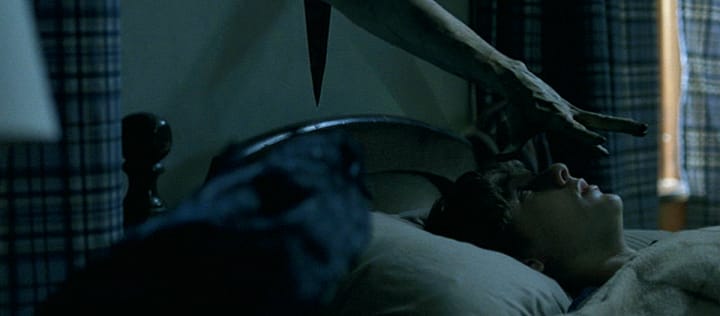
My Soul to Take is more of the same, on purpose.
Fictionally settled in the unspoken shadow of Salem, Riverton is a quaint little fishing town in Massachusetts trying too hard to make a folk legend of their local serial killer, The Riverton Ripper. Our story opens 16 years earlier, with a family man named Abel Plenkov (portrayed by the decorated Raúl Esparza) working in his basement. Suffering secretly with Dissociative Identity Disorder, he discovers the Ripper’s murder weapon in his home and realizes one of his multiple personalities is actually a murderer. His innocent personalities panic, urging Abel to turn himself in, but The Ripper forces Abel to kill his pregnant wife, himself, and attempts to kill Abel’s young daughter Leah, before being stopped by the police. Understandably, the appearance of The Ripper splits the crowd. Some can look past him being super cringe because his Rob Zombie-ish character design is admittedly dope. Others don’t think the soaked overcoat can cover the overly salacious and vulgar antics of the Freddy wannabe. Possessing all of the inflated ego with none of the pizazz, The Riverton Ripper speaks like a child whose turn it is to play the monster, minus the cuteness. On top of his stupendously corny lines that only edgy teens would find cool to say while stabbing someone, he even comes packaged with his own unnecessarily archaic catch phrase, “Fear Ye the Ripper!”
JESUS, this is so cheesy and awful and wait a minute, is that R.L. Jackson’s voice?! Shhh, it’s okay. I understand the rolled eyes and the tired sighs, friend. I swear I do. But, respectfully, you are watching a Wes Craven flick. Nothing you’re noticing is being left in by mistake.
After the opening crash scene – which I’ve always been told is the absolute highlight of the entire film – we’re treated to a theatrically recited synopsis of the opening we just watched by the boisterous Brandon (Nick Lashaway), our film’s Jerk Jock. It’s midnight on Ripper Day, the day Abel Plenkov supposedly died, and the seven teenagers fabled to possess the souls of each of his personalities are down at his alleged death sight to vanquish him back to his watery grave. In my humble-but-totally-aware-I’m-right opinion, Lashaway’s playful timbre while delivering his Ripper Day monologue is unfairly received as bad acting. His speech dramatically runs through the main cast’s archetypes and the details of the ritual as if it isn’t an annual shindig for them. I believe this perfectly encapsulates the true framing of the film that people seem to miss: this is all bullshit, and they know it.
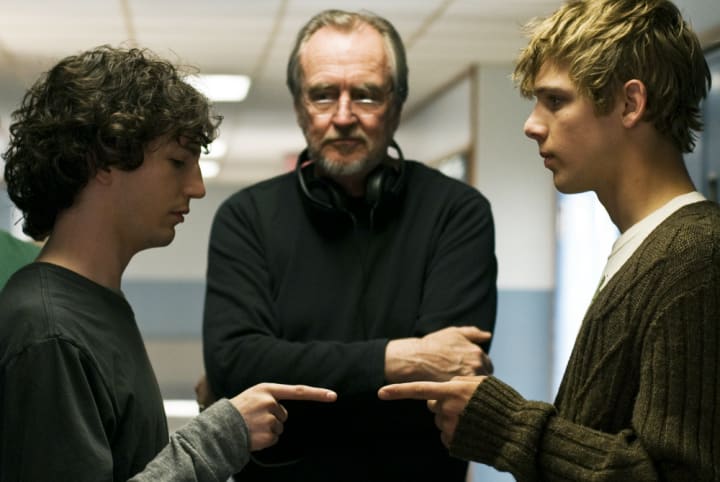
Craven is most famous for A Nightmare on Elm Street, but where he personally became a household name in my home began with him directing Scream, the brainchild of the brilliant screenwriter Kevin Williamson. He was Williamson’s first pick to direct, having literally written the scripts of the first two movies with him in mind, and the mega-series that was born of that partnership made Craven the undisputed King of Satirical Slashers. Like the works of Stephen King before them, these stories had a chokehold on small town horror fans who saw the monotony of their lives shaken up by Hollywood flocking to and mimicking their Main Streets. Every slasher murder mystery was starring satires of trauma-laden teens and getting more metafictional as they dragged on. With this in mind, it’s strange that readings of My Soul to Take are so uncharitable to this. From the first viewing, I was certain that these characters existed in a universe aware of all the horror movie clichés they'd come to recreate. The wardrobe, props, set design, and exaggerated diction of each character screamed late 2000s hellscape of horror remakes & unoriginal plots we were all disillusioned with, but undoubtedly influenced by.
Brandon’s melodramatic retelling of the opening and his impassioned introduction of The Riverton Seven isn’t the overly-expositional writing it appears to be at first glance – it’s the prelude to a show. It’s a group of kids putting on a community theater play about their local folk legend, coming up with spooky bullshit to cope with the pressure of being coincidental hometown heroes. The parents all knew the Riverton Ripper being a flesh & blood human was much scarier, so they made up some bullshit about him living under the bridge eating river moss and tree bark, only slicing up the bad kids who wouldn't eat their broccoli or go to bed on time.

The river monster Abel Plenkov is bullshit. His vengeful plot to kill his original seven victims again by tracking down the new keepers of their souls is bullshit. The adults of Riverton, like all of Craven’s mobs of detached parents, succeeded in turning their tragedy into a ghost story, leaving their children to perpetuate it. The Ripper went from a real-life predator to supernatural killer overnight, complete with bullshit superstitions and traditions to keep him at bay. There’s a silent agreement between the generations, as long as they agree to come to the church memorial with their parents, the kids are allowed to hold their ritual slaying of the Ripper. Jay Chan (Jeremy Chu) creates a puppet of The Ripper every year, a clearly dedicated and passionate prop director to Brandon’s screenwriter. This year’s hero character was to be played by Adam "Bug" Hellermen, volunteered by his yet-to-be-revealed sadist sister, but the ritual is unexpectedly interrupted by the police. While the boys in khaki inform us that Riverton will be laying Ripper Day to rest thanks to the new high school principal, Jay quietly shares his theories behind the new costuming of his Ripper puppet. Nothing being narrated to us by these teenagers is meant to be taken seriously or as a point of fact. These characters are well aware that the sensationalist retelling of their town’s most recent murder spree is mostly just bullshit their parents made up.
Well, all of these characters except for our protagonist, Bug Hellerman.
Bug is a weirdo protagonist, on purpose.
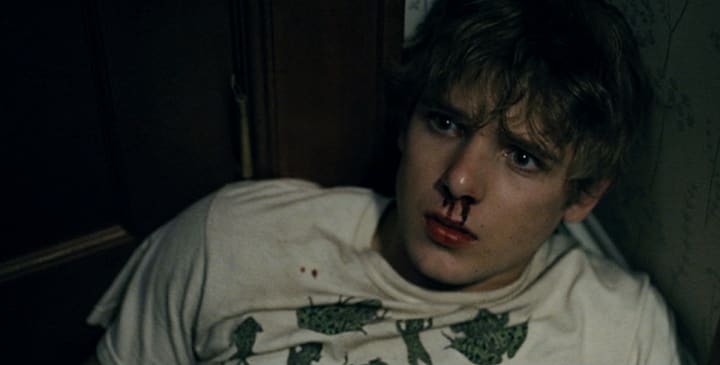
Another criticism I hear often about this movie is that Adam “Bug” Hellerman is an incredible bore of a "hero." Honestly, I suppose that could be true…if you hate innocent protagonists. Which I do not. For better or for worse, the entire town had decided to retcon the details of Bug's entire life, screaming a fairy tale over the bleak reality that his father was a mass murderer who killed his mother while she was pregnant with him. It’s clear that everyone around Bug seems absolutely convinced that he's destined to turn out like his father. Every Ripper Day they gather at the church to pray for him (footage of which was completely cut from the film), convinced that if they don’t, something in poor little Adam will snap and he’ll start slicing open all their kids. Most convinced of this seems to be the new school principal, proving himself to be overly influential in his efforts to uncover the reason behind everyone’s quiet acceptance of Bug’s deteriorating mental state.
Bug, deprived of oxygen during his birth, is described as a "sensitive" boy that's “a bit slower than the rest of [them],” and we see the extent of that immediately. He believes his friends’ blatantly fabricated Ripper stories wholeheartedly, visibly disturbed by the fact that he didn’t fulfill his role in their play while the others laugh it off. Ten minutes into the movie our protagonist is already convinced (then easily unconvinced) that he was the reason they’d all be dead by the end of the day. This movie presents such a flurry of red herrings incriminating Bug you almost feel forced to suspect him. He’s constantly waking in a violent panic the same way Plenkov does, for starters. The Riverton Seven have all completed the ritual before, making Bug the only one unable to reenact the grand betrayal that doomed them all. When the kids are running from the cops, he accidentally falls into and rises from the river, exactly like The Ripper seemingly does minutes later to kill Jay. If that wasn’t enough to implement him as our little mystery murderer, each character treats him with a quiet suspicion that varies from blatant pity to covert fear. His closest friends, Alex and Jerome (portrayed by John Magaro and Denzel Whitaker, respectfully), are constantly reassuring and empowering him, but not even they are unaware that they’re something significantly off about him. The group’s religious zealot prays specifically for his protection above them all, an act that seems romantic in nature until her love letter is realized to be a prophecy. The seniors say he’s bad luck to be around, specifically on Ripper Day. The high school’s Head Bitch In Charge, Fang (played by Emily Meade), even outright claims he’s been previously institutionalized for killing people. Considering how we spend a majority of our watch time with Bug as he bizarrely dissociates into impressions and startles awake from bloody hallucinations, it's not a hard sell. Truth be told, I once shared the opinion that they should have gone for the anti-twist ending, where it really was the character we suspected all along. After all, Abel Plenkov didn’t know he was out carving up psychology students at night, so why would this wet baby blanket of a boy?
In our final act, Fang is revealed to not only be Bug’s sister, but Leah, the child The Ripper failed to kill 16 years ago. Repulsed by the efforts of the adults of Riverton to continue shielding Bug from the truth, she reveals the painfully obvious fact they’re Abel Plenkov’s children to him in a hilarious fit of rage. She even takes back her main character persona for a second, saying she’s been forced to "live in a fucking nightmare" since Bug was born, positioning him as the main antagonist in her eyes. She waves that damn rocking horse their father made the night The Ripper made them orphans like Fred Kreuger’s filthy hat, daring her Aunt May to face the truth for once (if you don’t think that scene is a deserved bit of self-flatulating on Craven’s part, complete with a more satisfying slap, then I don’t know what to tell you). There’s even an alternative ending where Fang holds Bug at gunpoint, demanding to know if The Ripper had once again “jumped the next bus.” In this unseen moment, both brother and sister are shown to be equally terrified of Bug’s fragility leaving room for their father’s killer personality to return. Bug simply repeats her early declaration for him to “take a look in the mirror” before allowing her to pull the trigger. It’s a much darker conclusion, running quite counter to Bug’s closing speech about keeping The Ripper soul buried deep within him, but I’d say it rang truer to the years of contempt she’s felt towards her brother and her desire to be free of their father’s violence once & for all.
More than any other character, Fang serves as the personification of just how done everybody should be of this town’s bullshit. While everyone else in Riverton is comfortably convinced that Abel Plenkov is dead and their prayers & rituals will keep them safe, Leah Plenkov remains emotionally abandoned and perpetually cowering in the shadow of her murderous father.
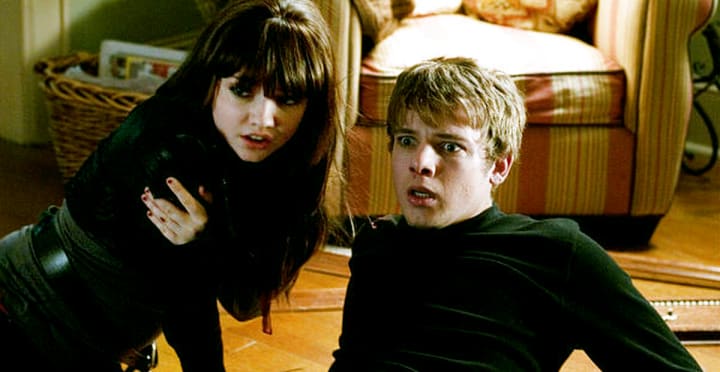
Every father in Riverton fucking reeks, on purpose.
In an interview with Jake’s Takes in October of 2010, Craven revealed that My Soul to Take was a deeply personal story to him, he even calls it the movie that scares him the most. It’s about a town being ravaged by a killer, yes, but it’s also a coming-of-age story about paternal relationships. His own father had died when he was fairly young, but he remembers sharing a fear of his potentially violent behavior with his siblings, saying “he wasn’t a monster, but he was a bit scary.” Craven’s filmography features a multitude of scary father figures, but none more so than My Soul to Take. We have the extreme in Abel, who’s deadly actions are literally so foreign to him that they’re attributed to a demonic personality, but affect his children all the same. Our only semblance of a middle man is Alex’s physically abusive stepfather, Quint, who’s off-screen death could only be described as Sweet, Delicious Karma. And lastly we have the overpowerful Principal Dennis Pratt, the only adult even jokingly suspected to be the revived Ripper. Pratt is the unsung villain of the movie that I personally blame for the entire fabric of this little town’s unraveling. His daughter is afraid to tell him she’s pregnant, and her child’s father is killed shortly after saying Pratt would probably have him murdered when he found out. His single scene where he insists he has the authority to have Bug institutionalized once again was enough for me to assume he could have been dead set on turning Riverton into a tourist trap by any means necessary. One of my few complaints about this movie’s plot is that we don’t see this principal go the way of Principal Arthur Fonzarelli). Each of these men exert extreme power over their children, and every one of their children expresses being deathly afraid of them in one way or another. Throughout the film, Bug is teased for the terrible crime of having an allegedly dead father, leaving him without true guidance and protection, only to emerge as the last man standing. As cheesy as a pseudo-happy ending for Bug and Fang may seem to be, it’s a key point when considering the overall message of the film. Adam “Bug” Plenkov was already at a risk to inherit his father’s schizophrenia, and like Abel, he seems to already be dedicated to protecting the souls he now houses within his mind.
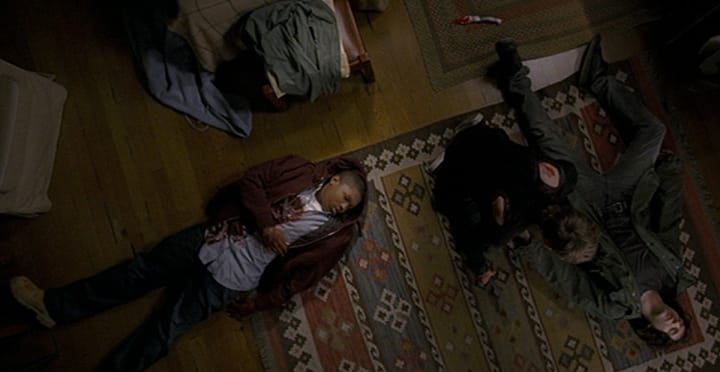
No horror movie using mental disorders as a plot device will ever be without valid criticism, and I'd be remiss to not mention that ableism is rarely one of the issues people seem to have with this movie. Perhaps Craven dodged that bullet by leaning on a generalization of Haitian culture given by EMS worker Jeanne-Baptiste (portrayed by the lovely Danai Gurira), or maybe it’s because the film depicts how much more likely people suffering from schizophrenic episodes are more likely to hurt themselves than others. Make no mistake, a man with DID possibly getting away with murder because their Bad Personality did it is pretty damn ableist. Abel Plenkov is still realistically branded The Riverton Ripper with full knowledge of his psychiatrist's files on his multiple personalities. This is genuinely too broad of an issue for me to ignorantly wax poetic about in this op-ed, it being a decades old genre-crossing issue of ableism in film and not just an issue with this movie. Ignoring this fact for the sake of shielding some media I like is just something I couldn't do, though.
All that being said, within the fictional context of this movie, and ONLY the fictional context of this movie, an ending where our mentally troubled protagonist begins and ends the film with essentially the same mental illness is rare. Bug is still hearing voices & seeing things by the time the credits roll and he's come to be proud of that. Killing his father’s Bad Soul doesn’t “fix” Bug, and absorbing it didn’t break him, either. More than anything, Bug vowing to continue fighting the Bad Soul within him with his friends felt less like a statement confirming that mentally ill people are dangerous timebombs who are bound to hurt others, but that we can always carry the people we love with us while battling our internal issues. Being “The Keeper of The Souls,” “the condor that eats death for breakfast,” “living in a house of blood,” that all sounds edgy and awesome, but Bug’s aware it’s bullshit. Fluffy, melodramatic bullshit he’s making up to feel better about the fact these tragedies will ultimately force him to take on the responsibility of managing his mental health. In the alternate endings, he proudly proclaims that he "woke up" before his father, having fully accepted all aspects of his mental state in a way that Abel could not. He finally fought The Ripper and won, so now it was time to put on a show for Riverton and fake being the hero who took down their newest serial killer. In the end, his delusions are ultimately not his enemy, but the strength he uses to accept the knowledge that was stripped from under the guise of protection.
Cute summary. So why does this movie still suck?
Well, Mr. Contrarian Strawman I’ve Constructed in My Own Head to Argue With, I invite you to watch it and see for yourself. To continue with my Header format: This movie sucks, on purpose. If you are even the least bit aware of how heavily this film was shaved down and how it was expensively shoehorned into the 3D market post-production, I feel like it's not hard to be slightly more charitable to it. I’m far from being delusional on the technical issues with this film, though. I can even personally list my favorite ones to get your ball rolling! How about the humor being juuust a bit too Diablo Cody-coded for the older fans of Craven’s work? Or the absence of his signature focus on practical make-up as opposed to digital gore? Pivotal scenes like the ones at the church or integral settings like Jay Chan's house being left on the cutting room floor? Shoddy post-production audio dubbing — I could go on! I may wholeheartedly believe this is a decent film, but that doesn’t mean it doesn't have obvious gaffs. I fully accept the editing as a valid criticism; in fact, I consider it the absolute killing blow to the film.
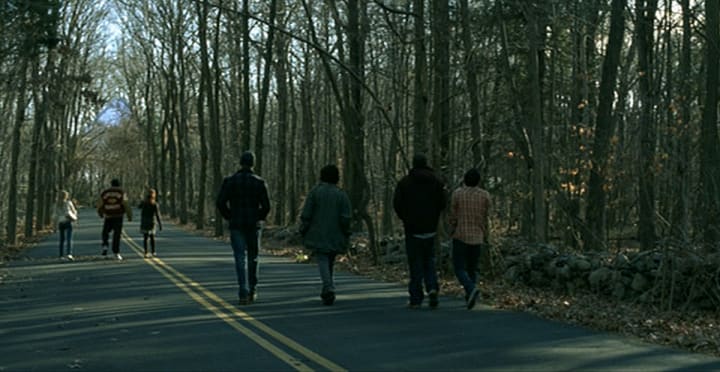
This flawed movie has visible bones, though, poking out noticeably behind skin stretched thin. It's pretty tough to see the rich and well-rounded intentions this story had crumble as it was forced into a square hole and not come out hating the result. Craven clearly had so much story to tell in 90 minutes, and much of the worldbuilding he intended to show was left out, only to be hinted at during the audio commentary on the DVD (that I, of course, own and cherish). For years I counted this movie among my favorite Bad Slashers because I was comfortable believing hopeful nostalgia (and a big, fat adolescent crush on Max Thieriot) were just clouding my judgment. Not hard to believe, I mean I was 16 years old when this shit came out. Where critics saw dull, joyless acting and a formulaic plot, I saw actors nailing the sarcastic, cynicism of the teenager I was at the time. Where reviewers saw bloated, contrived monologues, I saw my adolescence flair for the dramatic as I filmed pretend reels for my pretend résumé. Maybe I still love this movie despite it's obvious flaws because I was also a little weird ass kid with a fake raven named Edgar who never questioned why my mom shielded me from all the evils of the world.
Perhaps all that reigns true. Still, having returned to this movie again & again over the last 12 years, my desire to defend it has only strengthened. I guess the neatly wrapped conclusion of the innocent, angel protagonist surviving losing his wings will always be something I'm a huge sucker for. Like that of the on-screen Heather Langenkamp character in Wes Craven’s New Nightmare, Bug Hellerman is the unwilling protagonist in a film built around his discovery that he’s the protagonist of the film. Embracing the pieces of his seemingly breaking psyche helps him overpower the buried demons of his past, whether they come to him in Elm Street-esque visions or bumbling melee fights reminiscent of Ghostface chase scenes. Despite the wholly negative reception, Craven was always proud of this film, and I believe he deserved to be. The (3D, digital) blood, sweat, & tears put into this story was never lost upon me and like Bug, I concluded that I was just wrong and needed to start mirroring the smarter folks around me. Maybe this is one of those opportunities to be purposefully pretentious that I never take! I clearly believe myself to be more understanding of the language Craven chose to speak in this film than the fans who dislike it. If the humble-but-totally-aware-I’m-right part of me was allowed to puff out its chest more often, perhaps I could feel comfortable trying to convince you of my conclusion. Or maybe nothing I say can change enough minds for me to be satisfied with my efforts to defend this forgotten slasher. It’s entirely plausible that I could have an identical impact on the reputation of this movie if all I did was shrug and smugly say the ones who get it…get it, and the ones who don’t…don’t.
So, I will.
My Soul to Take is a good movie, actually!
(but only if you're watching the nonexistent director's cut I'd stab my best friend to get a hold of.)
About the Creator
Elle Janay
A perpetually sick serial crafter with too much free time on her hands.






Comments
There are no comments for this story
Be the first to respond and start the conversation.